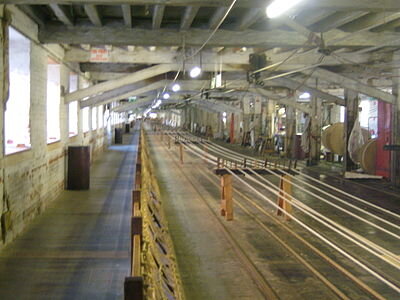A ropewalk
In that building, long and low,
With its windows all a-row,
Like the port-holes of a hulk,
Human spiders spin and spin,
Backward down their threads so thin
Dropping, each a hempen bulk.
At the end, an open door;
Squares of sunshine on the floor
Light the long and dusky lane;
And the whirring of a wheel,
Dull and drowsy, makes me feel
All its spokes are in my brain.
As the spinners to the end
Downward go and reascend,
Gleam the long threads in the sun;
While within this brain of mine
Cobwebs brighter and more fine
By the busy wheel are spun.
Two fair maidens in a swing,
Like white doves upon the wing,
First before my vision pass;
Laughing, as their gentle hands
Closely clasp the twisted strands,
At their shadow on the grass.
Then a booth of mountebanks,
With its smell of tan and planks,
And a girl poised high in air
On a cord, in spangled dress,
With a faded loveliness,
And a weary look of care.
Then a homestead among farms,
And a woman with bare arms
Drawing water from a well;
As the bucket mounts apace,
With it mounts her own fair face,
As at some magician's spell.
Then an old man in a tower,
Ringing loud the noontide hour,
While the rope coils round and round
Like a serpent at his feet,
And again, in swift retreat,
Nearly lifts him from the ground.
Then within a prison-yard,
Faces fixed, and stern, and hard,
Laughter and indecent mirth;
Ah! it is the gallows-tree!
Breath of Christian charity,
Blow, and sweep it from the earth!
Then a school-boy, with his kite
Gleaming in a sky of light,
And an eager, upward look;
Steeds pursued through lane and field;
Fowlers with their snares concealed;
And an angler by a brook.
Ships rejoicing in the breeze,
Wrecks that float o'er unknown seas,
Anchors dragged through faithless sand;
Sea-fog drifting overhead,
And, with lessening line and lead,
Sailors feeling for the land.
All these scenes do I behold,
These, and many left untold,
In that building long and low;
While the wheel goes round and round,
With a drowsy, dreamy sound,
And the spinners backward go.
“The Ropewalk,’’ by Henry Wadsworth Longfellow (1807-82), a Portland, Maine, native and later a professor at Harvard. During some of his career he was America’s most famous poet. Ropewalks, where rope was made, especially for New England’s maritime-related businesses, were common enterprises even into the 20th Century. They tended to be sweat shops.
Longfellow’s grave in Cambridge, Mass.’s famous Mount Auburn Cemetery











